Crypto With Low Transaction Fees: Top Options for Cheap Transactions in 2025
When it comes to sending or receiving crypto, one of the first things users notice is how much they pay in transaction fees. Moving funds between wallets, trading on exchanges or simply sending crypto to a friend, high fees can eat into your profits or savings. That’s why many crypto enthusiasts are now focusing on crypto with low transaction fees, currencies designed to keep costs down while still offering reliable, fast and secure transactions.
In 2025, the demand for such coins is stronger than ever, especially as adoption grows and networks get busier. In this article, we’ll explore the most promising low-fee cryptocurrencies you can use today.

Problems with popular cryptocurrencies
Cryptocurrencies like Bitcoin (BTC) and Ethereum (ETH) paved the way for digital finance but struggled with affordability. High transaction fees during periods of network congestion can deter users from these cryptocurrencies, impacting their financial operations and accessibility:
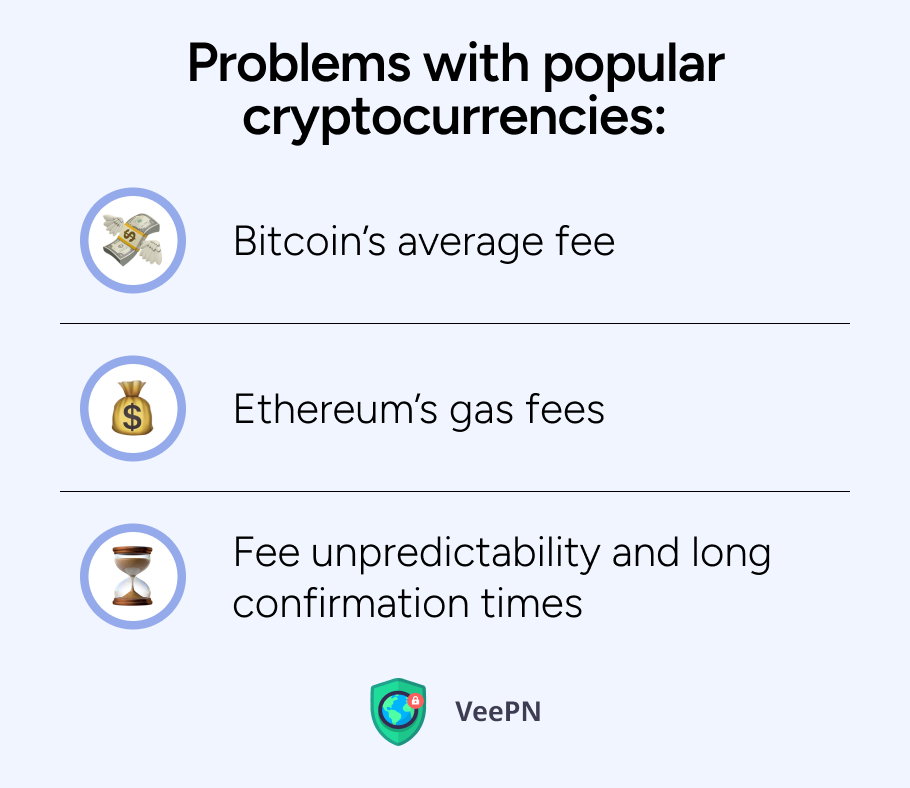
- Bitcoin’s average fee can skyrocket during high demand, making it unsuitable for microtransactions.
- Ethereum’s gas fees have been known to skyrocket during NFT launches or decentralized finance DeFi booms, pricing out smaller investors.
- Fee unpredictability and long confirmation times during congestion make it hard to budget or plan transactions.
This has opened the door for alternative cryptocurrencies that focus on scalability, lower fees and faster transactions. Let’s have a look at some of their advantages.
Benefits of using cryptocurrencies with low transaction fees
Low-fee cryptocurrencies offer:
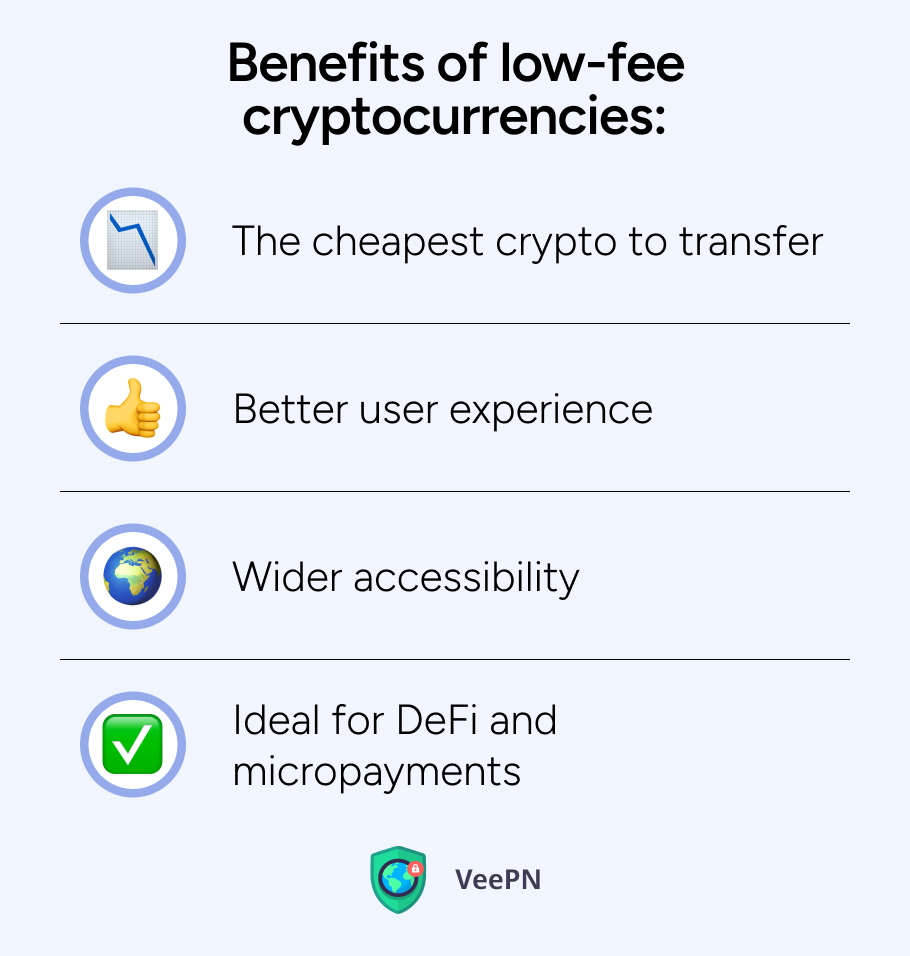
- The cheapest crypto to transfer: Whether you’re sending funds abroad, tipping creators or paying for goods, lower fees save you money. Cheaper transactions, such as those offered by Bitcoin Cash, minimize costs and enhance user efficiency in crypto trading.
- Better user experience: Fast confirmations and cheap fees make daily transactions smoother. Instant transfers, like those provided by Nano (NANO), offer zero fees and lightning-fast transactions, making them ideal for microtransactions and international payments.
- Wider accessibility: Low fees encourage newcomers, small businesses and developing economies to join the crypto revolution.
- Ideal for DeFi and micropayments: Low-fee tokens enable cost-effective participation in DeFi, gaming and digital tipping.
And low-fee cryptos are crucial for global adoption, especially in markets where financial resources are limited. They allow individuals to participate in the digital economy without losing a big chunk of their funds to network fees.
Factors affecting crypto exchange fees
The price of trading on a crypto exchange can differ a lot due to network congestion, the way agreements are reached, and the network’s features. To decrease your costs and choose the best crypto wallet with a low transaction fee, you must keep these factors in mind.
For this reason, Bitcoin Cash (BCH) attracts people who prefer to use it for everyday payments, since its fees are lower than Bitcoin’s. Having larger blocks means there is less chance of network overload and fees are reduced. Also, Stellar (XLM) and Ripple (XRP), being cryptocurrencies, help people complete cross-border payments more conveniently because they offer low fees in comparison to conventional financial institutions. These digital currencies are made to manage a high number of transactions without driving up fees.
Consider the following points as criteria when choosing a cryptocurrency so you can find the best deal. If you choose a cryptocurrency with efficient networks and low-cost transactions, you will pay less and have safer and faster exchanges. Not only does this process save you cash, but it also makes your digital asset experience more enjoyable.
What to consider when choosing low-fee cryptocurrencies
When choosing low-fee cryptocurrencies, consider:
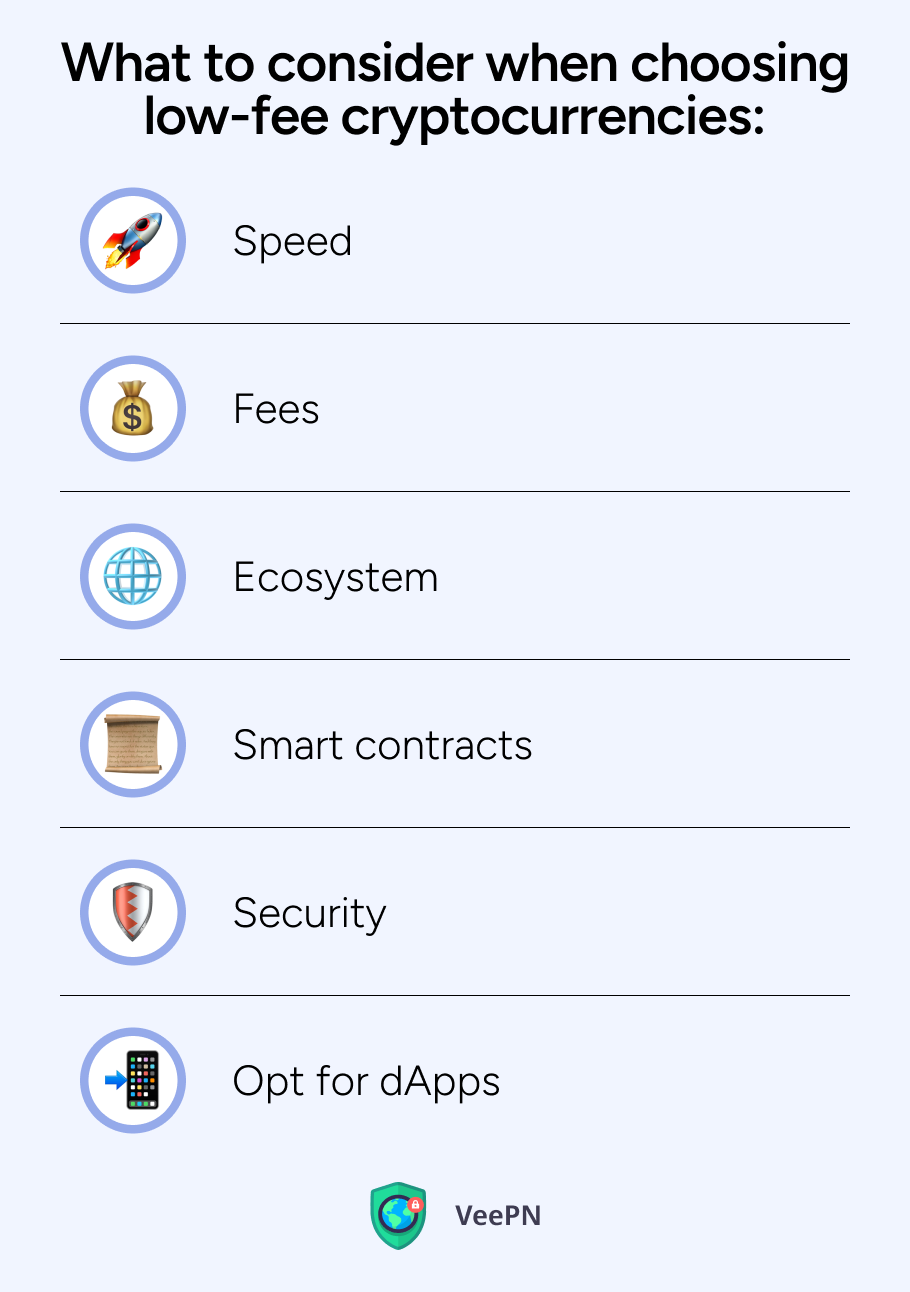
- Speed: Fast transaction speed = smooth user experience.
- Fees: Avoid coins with fees that can spike.
- Ecosystem: Make sure the coin is widely accepted, has a healthy dev community and is listed on good exchanges.
- Smart contracts: Make sure the ecosystem supports smart contracts.
- Security: Make sure the network is decentralized and actively maintained by a developer community.
- Opt for dApps: Look for ecosystems that support decentralized apps (dApps). They’re cheap, scalable, efficient and good for many sectors.
These signs will help you tell a low fee coin from a cheap one that’s unreliable or hard to use.
Top low-fee cryptocurrencies to watch in 2025
Check out these lowest fee crypto trending in 2025:
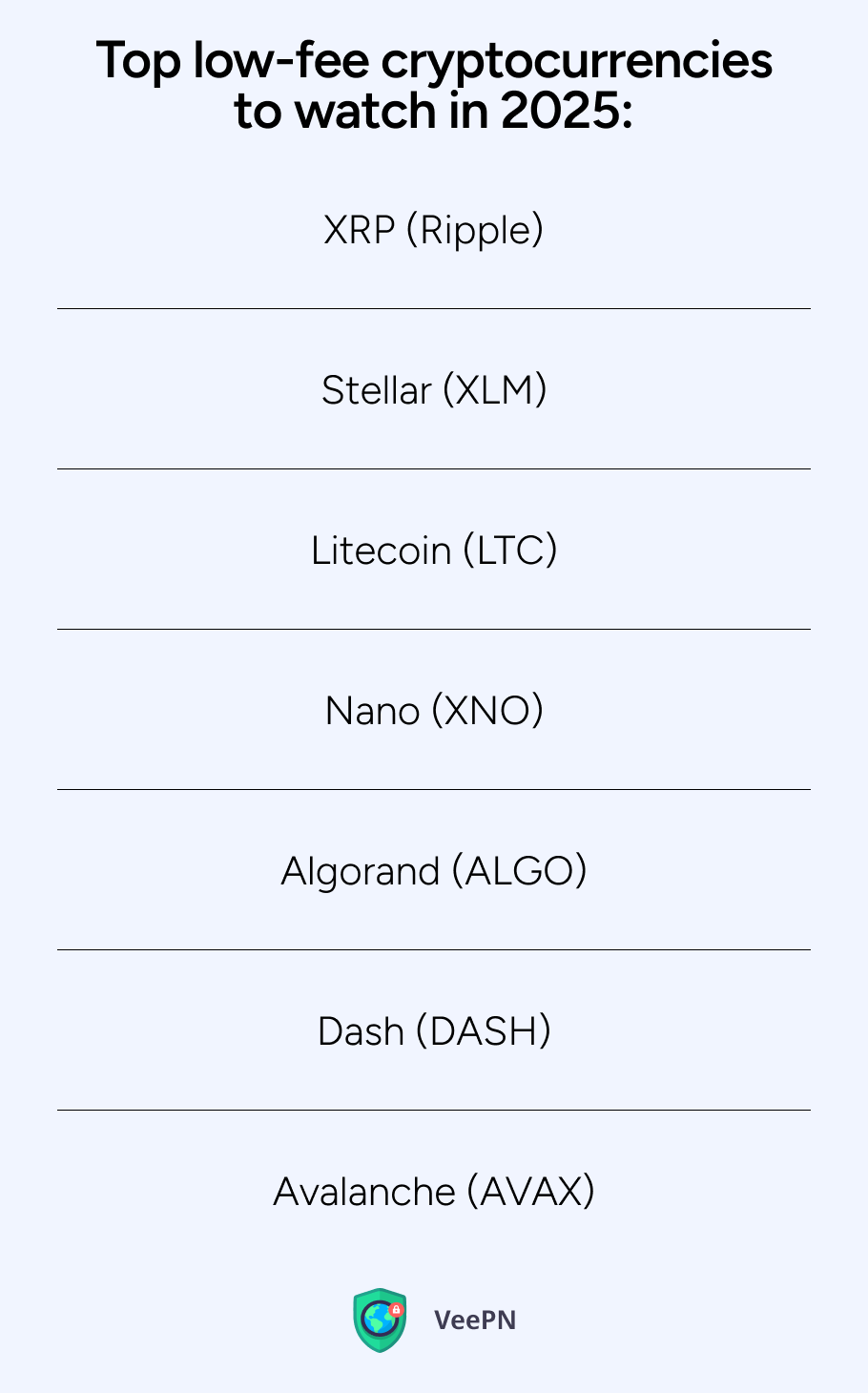
- XRP (Ripple): With transaction costs often under a cent, XRP is designed for fast global payments. It’s popular among banks and remittance services and excels in cross-border transactions.
- Stellar (XLM): Created by a Ripple co-founder, Stellar focuses on financial inclusion and is ideal for sending money across borders at minimal cost. It powers real-world projects like humanitarian aid distribution.
- Litecoin (LTC): A long-standing Bitcoin alternative that processes transactions faster and with lower fees, making it suitable for payments and everyday use.
- Nano (XNO): This coin has feeless, instant transactions thanks to its block-lattice architecture. It’s great for microtransactions and tipping due to its real-time settlement. Nano is also considered one of the cheapest transaction fee cryptocurrency options due to its zero transaction fees.
- Algorand (ALGO): It offers cheap, scalable solutions perfect for DeFi and NFT projects. Its consistent low fees and strong backing make it an emerging star in smart contract platforms.
- Dash (DASH): Known for its focus on privacy and low-cost, instant payments, Dash is widely used in Latin America for day-to-day purchases.
- Avalanche (AVAX): Especially on its C-Chain, Avalanche supports low-fee transactions with high throughput for DeFi use, offering a responsive and cost-effective alternative to Ethereum.
However, trading low-fee crypto comes with the same risks as any other cryptocurrency, so we recommend you use a virtual private network (VPN) to protect your assets. Why is a VPN so necessary? Let’s take a deeper look at its value to your crypto security.
How a VPN can help with your crypto transactions
A VPN isn’t just for privacy: it plays a key role in safer crypto trading:
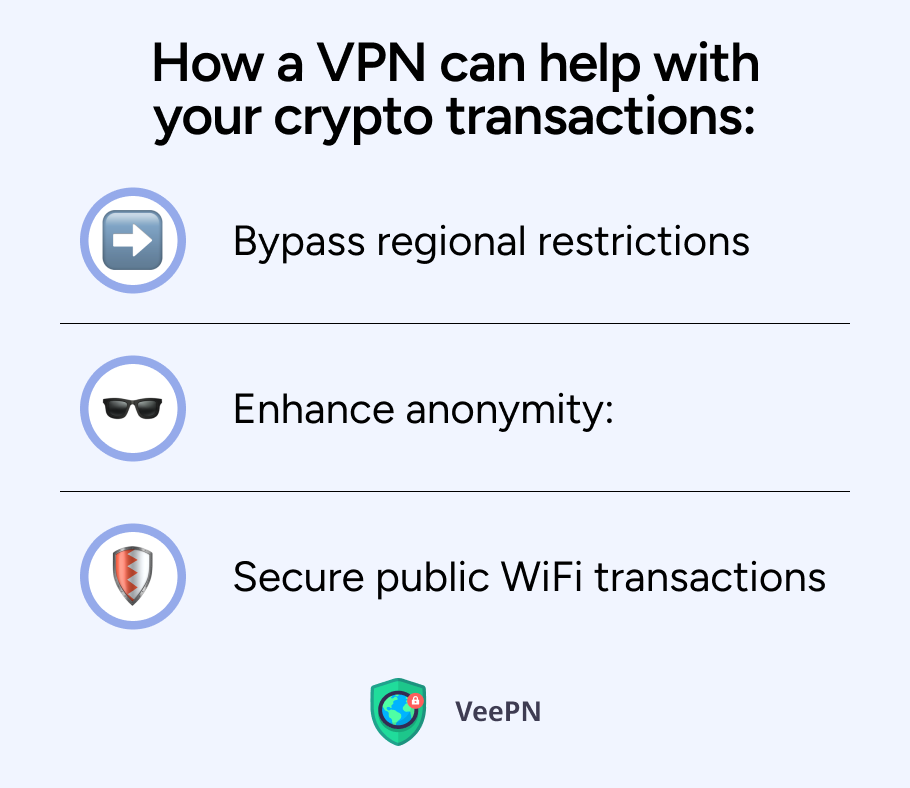
- Bypass regional restrictions: Access crypto exchanges or DeFi platforms blocked in your region.
- Enhance anonymity: Hide your IP address to prevent tracking when using wallets or exchanges.
- Secure public WiFi transactions: Trade or transfer funds safely even when connected to potentially risky public networks. Lower transaction fees can significantly benefit users, especially for high-volume transactions, by reducing overall costs.
Note: VeePN doesn’t encourage using a VPN in any way that would potentially violate the Terms of Service of other platforms. For more details, please read the VeePN Terms of Service.
Whether you’re traveling or on a public network, a VPN keeps your crypto sessions private and secure. We recommend you not to use free VPNs as they don’t have enough security features to protect you reliably. Instead, use VeePN. Why? Let’s find out!
Why VeePN is the perfect crypto companion in 2025
VeePN can be your crypto trading shield because of the following features and benefits:
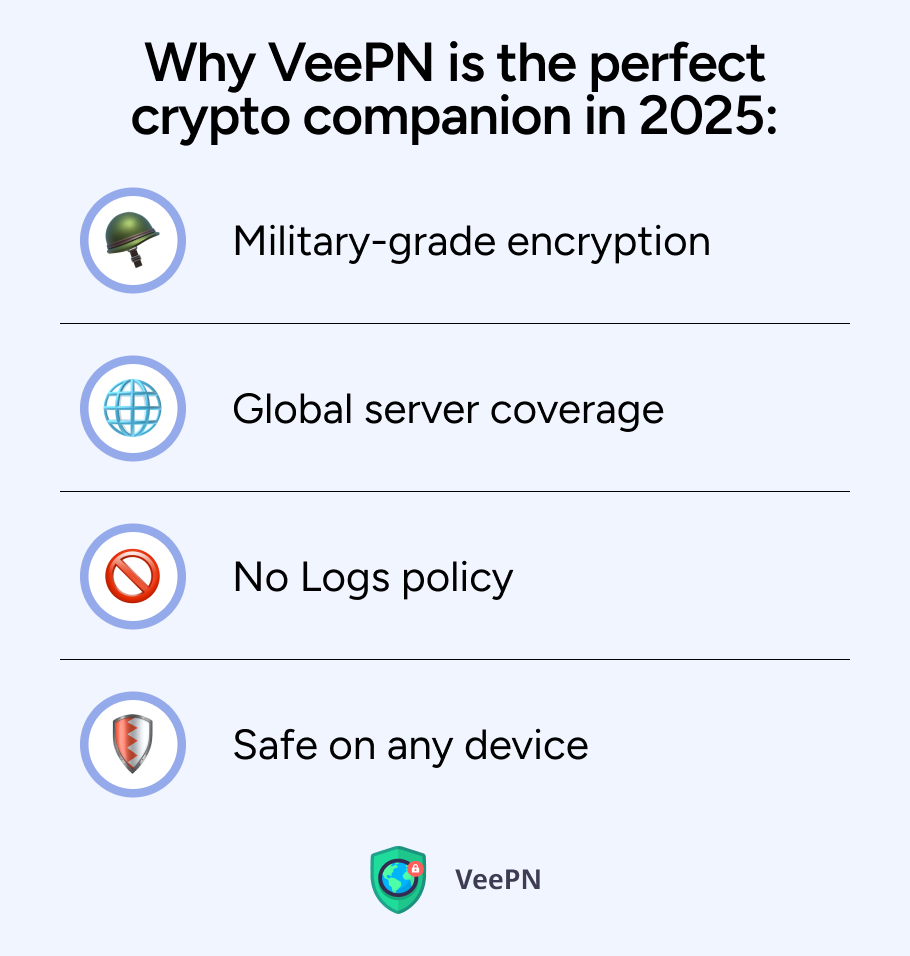
- Military-grade encryption: Your trading and transactions are private and secure as nobody can intercept your Internet traffic and decipher it.
- Global server coverage: With 2,500+ servers in 89 locations, you can access crypto platforms worldwide without restrictions.
- No Logs policy: VeePN never logs your activity for extra anonymity.
- Safe on any device: Use VeePN on up to 10 devices simultaneously, from smartphones to desktops, perfect for crypto users on the go.
Download VeePN now and get a 30-day money-back guarantee!
FAQ
Nano (XNO) is the cheapest cryptocurrency to send in 2025 because it’s feeless and instant. Other cheap options are Stellar (XLM) and XRP, which have low fees and fast settlement times.
Bitcoin and Ethereum have high fees because of network congestion and limited transaction throughput. When many people try to send transactions at the same time, they have to compete by paying higher fees to get prioritized by miners or validators.
A VPN doesn’t lower exchange fees directly, but it can help you access platforms with lower fees that might be geo-restricted. It also secures your data and keeps your trading activity anonymous, especially on public WiFi.
VeePN is freedom
Download VeePN Client for All Platforms
Enjoy a smooth VPN experience anywhere, anytime. No matter the device you have — phone or laptop, tablet or router — VeePN’s next-gen data protection and ultra-fast speeds will cover all of them.
Download for PC Download for Mac IOS and Android App
IOS and Android App
Want secure browsing while reading this?
See the difference for yourself - Try VeePN PRO for 3-days for $1, no risk, no pressure.
Start My $1 TrialThen VeePN PRO 1-year plan






